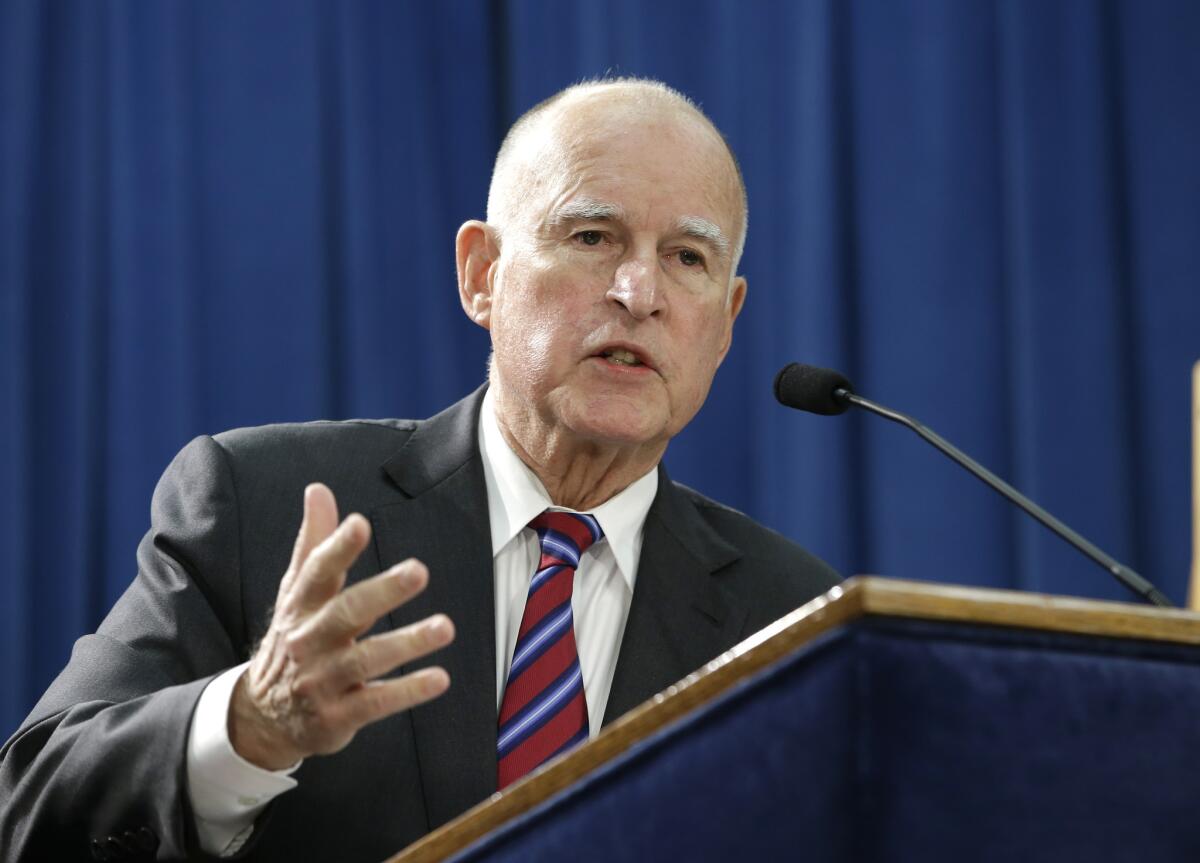Judge blocks Gov. Brown’s parole ballot measure

Gov. Jerry Brown
- Share via
Reporting From Sacramento — Gov. Jerry Brown’s ballot measure to speed up the parole of some California prisoners was blocked from signature gathering on Wednesday afternoon, after a Sacramento judge ruled that the public should have been given additional time to review it.
The ruling, which a spokesman for Atty. Gen. Kamala Harris said will be appealed, threatens to either derail the governor’s high-profile attempt at major reform or force his political team to spend millions of dollars on a last-minute dash to collect voter signatures.
Judge Shellyanne Chang sided with Sacramento District Attorney Anne Marie Schubert and the California District Attorneys Assn. in finding that there was “no substantial compliance” by Harris and her staff with the 2014 state law that governs late changes to proposed ballot measures.
The political impact of Chang’s ruling is clear. If Brown and his political allies must now start from scratch on a criminal justice initiative, they may not be able to begin gathering voter signatures until the end of March, at best — a timeline that could be too late for collecting the more than 585,000 valid signatures he needs to qualify a proposal for the fall ballot.
See the most-read stories this hour >>
Brown unveiled his sweeping plan in late January to allow for early parole of those convicted of a nonviolent offense, with the decision based on an inmate’s behavior while behind bars. The crux of the legal challenge centered on his decision to join the backers of an existing initiative, one focused on juvenile crimes, and combine all of the policy changes into a single amended ballot measure.
But the backers of the legal challenge argued in court that Brown’s changes were so sweeping that they amount to creating an entirely new proposal, one they suggested was intentionally designed to be a shortcut in the normal initiative process.
“He should have just stood in line like everyone else,” said attorney Tom Hiltachk, representing the district attorneys who filed the lawsuit, in describing Brown’s actions. He said that when the governor’s parole proposal was added as an amendment to the existing juvenile justice initiative, it should have triggered a brand new top-to-bottom review.
Attorney James Harrison, representing the official proponents of the amended initiative, said there may now be an appeal for “emergency relief” directly to the California Supreme Court.
“The voters should have the opportunity to decide whether to qualify it for the ballot,” he said in court.
The case is one of the biggest tests to date of a 2014 law designed to improve California’s initiative process by, in part, allowing amendments to a proposed ballot measure after it’s formally filed with state officials.
During the hourlong hearing in court, Chang repeatedly criticized the decision by the attorney general to accept Brown’s numerous changes to an initiative on which the public comment period had already endned.
“The purpose and intent” of the 2014 initiative reform law, Chang said in her ruling, “has been violated.”
Follow @johnmyers on Twitter, sign up for our daily Essential Politics newsletter and listen to the weekly California Politics Podcast
MORE POLITICAL COVERAGE
Preliminary election results favor recall of Carson’s controversial city clerk
Ex-state Sen. Leland Yee gets 5 years in prison in corruption case
Why a congresswoman from Los Angeles is talking about Africa
More to Read
Get the L.A. Times Politics newsletter
Deeply reported insights into legislation, politics and policy from Sacramento, Washington and beyond. In your inbox twice per week.
You may occasionally receive promotional content from the Los Angeles Times.











